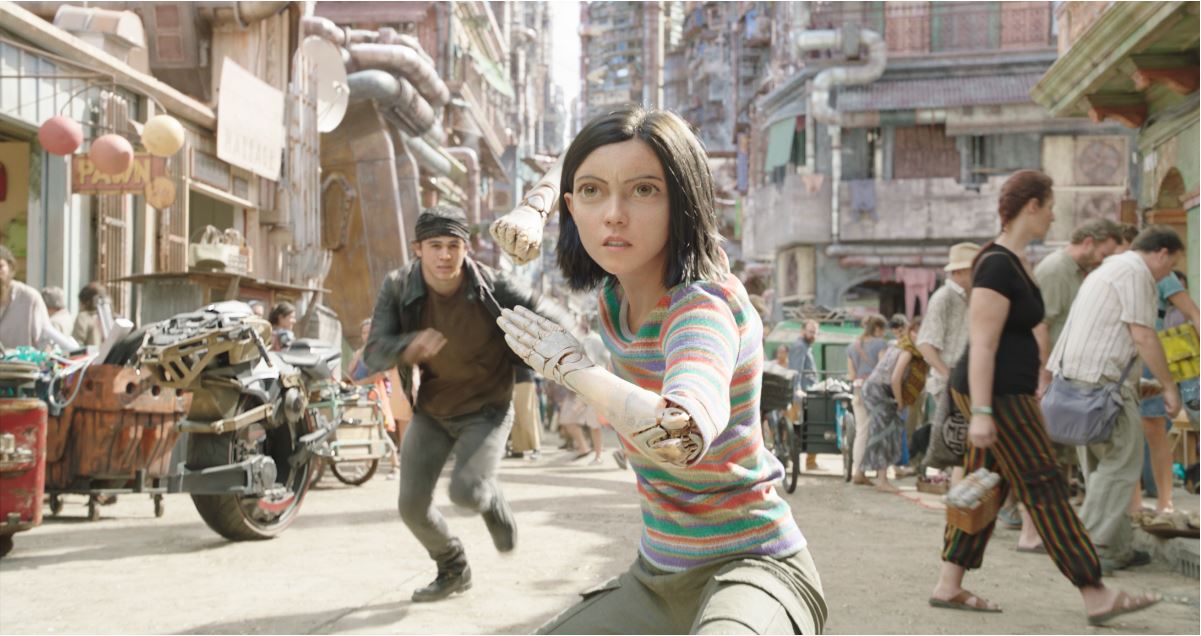How Alita: Battle Angel Found an Unlikely Fanbase in MRA Trolls
Men who hate women love Alita, but why?

Internet trolls, by definition, hate everything. They hate women running for office, they hate non-white people in Star Wars, and boy oh boy do they hate female superheroes. We here at TMS are unfortunately experts on this subject, because every time we publish an article on these topics, we are inundated with angry comments, tweets, and hate email from a host of angry anonymous dudes who are furious because WOMEN!
The most recent herpes-like outbreak of impotent male rage came last month, when men in basements across America furiously scorned the release of Marvel’s first female-led feature, Captain Marvel. Manboys were incensed over several things, including Brie Larson not smiling, her lack of a “sexy” outfit, her outspoken feminism, and her impassioned call for diversity in film journalism.
If you were a woman on social media who shared excitement over Carol Danvers, chances are that you were flooded with a wave of egg-profiled babymen with 11 followers, calling you names from the Wheel of MRA Insults: “feminazi,” “SJW,” “libtard,” “cuck,” or my favorite, “dumb cunt.”
But something else strange was happening. Along with the usual Pepe-faced insults was a call to action to support what these men thought was a true depiction of a female superhero: Alita: Battle Angel. Trolls all across the internet called on their brethren to boycott Captain Marvel and spend their sweaty dollars on Alita instead. Alt-right troll Jack Posobiec posted a video asking fans to skip Captain Marvel and see Alita, dubbing it the #AlitaChallenge.
The challenge failed because of course it did. Alita went on to gross $84 million domestically and over $300 million worldwide, while Captain Marvel just sailed past $1 billion at the box office.
But why did so many men glom onto Alita: Battle Angel as the anti-Captain Marvel? Is it because the film was directed and produced by fanboy patron saints Robert Rodriguez and James Cameron? Or is it because the film is a Fox property, unlike Star Wars and Marvel, which are both owned by Disney?
As someone who reviewed ABA and enjoyed its wild special effects and world building, I found Alita, as a character, to be the weakest part of the film.
The robot girl warrior taps into several problematic tropes regarding “strong female leads,” including the “born sexy yesterday” cliche, which gives us innocent childlike women who also possess massive power but can’t find their way without a man.
But Alita also taps into the male fantasy of a submissive girl robot devoted to her man. From the moment Alita meets street hustler Hugo (Keean Johnson), she becomes immediately enamored of him. He also happens to be the first male character she meets outside of her adopted father figure, Dr. Ido (Christoph Waltz). Alita’s slavish devotion to Hugo reminded me of one of Futurama’s best episodes: season 3, episode 15, “I Dated a Robot.”
In the episode, Fry falls madly in love with a robot programmed to look like Lucy Liu, much to the horror of the Planet Express crew. Much of the Liu-bot’s appeal comes from her pre-programmed subservience to Fry. She embodies the sci-fi ideal of the female sex robot, designed only to service her master.
We’ve seen this sexbot character many times in sci-fi: from the busty fembots of Austin Powers, to the hosts of Westworld, to the pleasure model replicants of Blade Runner, to the docile Stepford wives. Occasionally, we’ll get a male version, like Jude Law’s Gigolo Joe in A.I. Artificial Intelligence, but these bots are almost always women.
Alita is not a sexbot, but perhaps something even worse. She is a lovebot, a cyborg that is powered by an unshakable and unearned devotion to the first boy she meets. Early on in the film, she opens her chest cavity and literally offers her mechanical heart to Hugo, saying, “I’d do whatever I had to for you. I’d give you whatever I have. I’d give you my heart.”
What Alita offers isn’t sex. In fact, despite her shapely figure she remains innocent and childlike—that is, until she starts going into warrior mode and kicking ass. This tamped down sexuality combined with her fighting skills makes Alita a chaste version of the classic “girls with guns” trope, a superficial read on feminism that equates violence with agency.
And it’s exactly this kind of “female empowerment” that entitled fanboys crave: a hot woman warrior who fights not for herself, but for her man, while remaining utterly devoted to him. No wonder she appeals to internet trolls. For them, she’s a female fantasy come to life.
(image: 20th Century Fox)
Want more stories like this? Become a subscriber and support the site!
—The Mary Sue has a strict comment policy that forbids, but is not limited to, personal insults toward anyone, hate speech, and trolling.—
Have a tip we should know? tips@themarysue.com